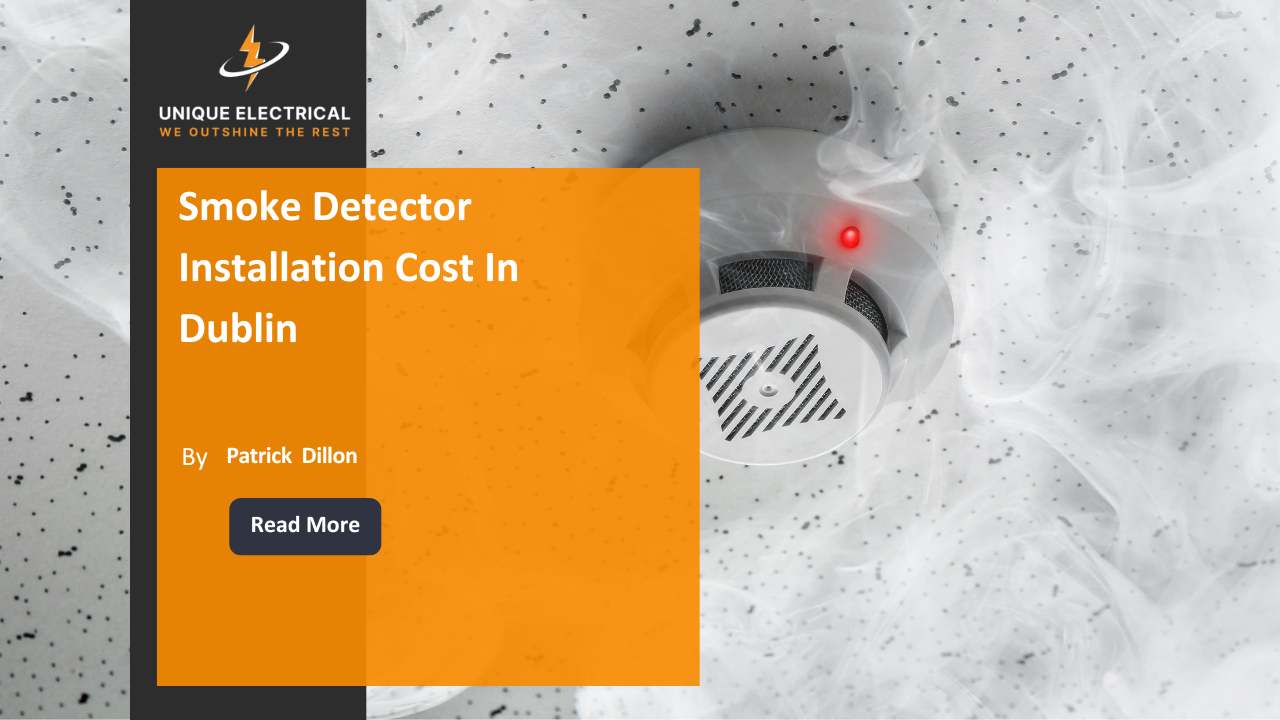Electrical safety is a matter of significant importance that should never be taken lightly. While the internet is filled with DIY guides and tutorials, some tasks are best left to professionals.
One such task is changing electrical sockets. It might seem like a simple task, but it carries significant risks if not done correctly. In fact, in some cases, it’s not even legal to do it yourself unless you’re a Safe Electrical Registered electrician.
This blog delves into the reasons why DIY electrical work, particularly in Dublin, might not be the best approach. We'll explore the risks involved, the signs that indicate the need for professional attention, the legal standards governing electrical work, and the undeniable importance of professional certification.
Our goal is to provide you with the knowledge you need to make informed decisions about the electrical safety of your home. So, let's dive in and learn how to ensure our homes are safe and sound!
What Signs Indicate Your Electrical Sockets Need Expert Attention?
Recognizing the signs that your electrical sockets need expert attention is crucial for maintaining a safe home environment. Here are some key indicators that it's time to call a professional:
Frequent Tripping of Circuit Breakers
If your circuit breakers trip frequently, it's a sign that your electrical system is overloaded. This often happens because sockets are either faulty or not suitable for the appliances being used.
Discoloration or Scorch Marks
Discoloration or scorch marks around your sockets indicate overheating, which is a serious fire risk. This usually means the wiring behind the socket is damaged or the socket itself is failing.
Buzzing Sounds or Vibrations
Sockets should not make a noise. If you hear buzzing sounds or feel vibrations when appliances are plugged in, it could mean loose wiring or a malfunctioning socket.
Sparks When Plugging or Unplugging Devices
Seeing sparks when you plug in or unplug devices is a clear sign of a faulty socket. While occasional small sparks can be normal, larger sparks indicate a serious problem that needs immediate attention.
Loose Sockets
Loose sockets can lead to poor connections and overheating. If the socket moves when you plug or unplug devices, it's time for a repair or replacement.
Why Is It Not Safe to Change Electrical Sockets Yourself?
Changing electrical sockets might seem like a simple task, but it comes with risks that shouldn't be underestimated. Without the proper knowledge, tools, and precautions, what starts as a quick fix can quickly escalate into a dangerous situation. Here's why you might want to think twice before undertaking this task yourself:
Risk of Electric Shock
Electric shock is a direct risk when working with electrical wiring. Even a task as seemingly simple as changing a socket can expose you to the danger of electric shock if the power is not completely turned off or if wires are handled improperly.
Possibility of Incorrect Installation
Incorrectly installed sockets can lead to serious issues down the line, including malfunctioning appliances, intermittent power supply, or even the risk of fire. The right installation requires a good understanding of wiring and electrical standards.
Fire Hazards
Faulty wiring or improper connections can cause overheating and sparking and potentially lead to fires. This risk is significantly heightened when electrical work is done without a thorough knowledge of electrical systems.
Electrical Code Violations
DIY electrical work often runs the risk of violating local building and electrical codes. This can lead to fines, but more importantly, it can make your home unsafe and potentially cause issues with insurance or future property sales.
Risk of Damaging Electrical System
Without the correct knowledge and tools, there's a real risk of causing more damage to your home's electrical system. This could mean more expensive repairs down the line, carried out by a professional electrician.
What Legal Standards Must Be Met When Changing a Plug Socket in Dublin?
In Dublin, changing a plug socket must adhere to the National Wiring Rules for Electrical Installations, outlined in I.S. 10101:2020, published by the National Standards Authority of Ireland (NSAI). These standards ensure that electrical work meets the following criteria:
Safety and Compliance
All electrical installations, including the changing of plug sockets, must be carried out to protect individuals from fire hazards and electric shocks. This involves using the correct type of socket, proper installation techniques, and ensuring the electrical system can handle the load.
Certification by a Registered Electrical Contractor (REC)
In Dublin, any electrical work that alters the main distribution of electricity must be carried out by a Registered Electrical Contractor (REC), registered with Safe Electric, the regulatory scheme for electrical contractors. After completion, the REC must provide a Completion Certificate, confirming the work complies with the National Wiring Rules.
Building Regulations
Electrical work, including socket changes, must comply with Part L (Conservation of Fuel and Energy) of the Building Regulations, ensuring energy efficiency is considered and maintained.
Why is Professional Certification Crucial for Electrical Work?
Professional certification is crucial for electrical work for several reasons, especially in a regulated environment like Dublin:
Ensures Safety
Certified electricians have undergone rigorous training and assessment to ensure they can perform electrical work safely and competently. This reduces the risk of electric shocks, fires, and other hazards.
Compliance with Standards
Certified professionals are familiar with national and local electrical standards and regulations. Their work ensures compliance, avoiding legal issues, and ensuring the safety of the installation.
Insurance Implications
Work carried out by uncertified individuals may not be covered by home insurance policies. If DIY electrical work leads to damage or injury, the homeowner may be liable.
Quality of Work
Certification implies a level of skill and knowledge that guarantees the quality of the electrical work. This proficiency ensures that electrical installations and repairs are durable and reliable.
Legal Obligations
In many cases, the law requires electrical work to be carried out by or under the supervision of certified professionals. Non-compliance can lead to penalties, fines, or mandatory correction of the work at the homeowner’s expense.
Conclusion: Don't Risk Your safety; Hire a Professional
The journey of maintaining and upgrading our homes is filled with numerous DIY opportunities. However, when it comes to electrical work like changing sockets, it's clear that the risks far outweigh the potential rewards.
From the dangers of electric shock to the complexities of adhering to legal standards in Dublin, the wise action is to hire a professional.
Certified electricians have the training, experience, and understanding of local regulations to ensure that your electrical upgrades are safe, compliant, and efficiently executed.
Don't compromise on the safety of your home or loved ones. Contact Unique Electrical for expert electrical services. Our certified team ensures safe, compliant, and high-quality work. Let us handle your project efficiently.












